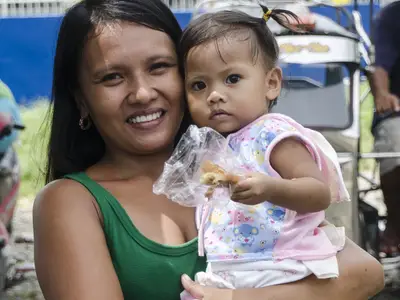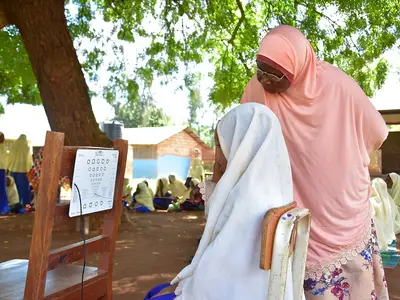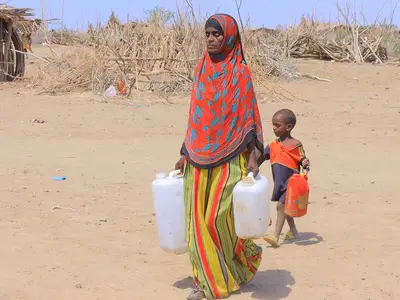Flipping the script in development; leading through local partners to deliver shared solutions.
At RTI, locally led development is not just a fleeting priority; it forms the foundation of our international development work. We are committed to doing development differently by ensuring that local partners are in the driver’s seat of their own development. We prioritize their ideas, perspectives, and leadership during project design and throughout implementation. We are also committed to increasing the number of local staff in leadership positions, investing in joint research with local institutions, continuously seeking feedback from local partners through annual locally led learning events, and measuring locally led development to hold ourselves accountable.
As both a global research institute and a leading international development organization dedicated to improving the human condition, locally led development is integral to RTI’s goal of positively impacting the well-being of 1 billion people by 2030 through science-based solutions in climate, education, health, and equity.

RTI’s Unique Approach to Locally Led Development
Our approach to locally led development is steeped in our decades of experience in collaborating with and learning from local partners. It is also an approach that we are committed to reflecting on and improving over time since we recognize that this is an evolving process and we do not have all the solutions.
The core of our approach relies on the expertise and knowledge of the local partners and stakeholders that we work with on our proposals and projects. Below, we outline the four pillars of our approach.
View our brochure: English
View our brochure: Spanish
View our brochure: French
1. We Shift Power to Local Actors so that They are Front and Center
We view local partners as essential drivers and owners of the development process. As an international implementing partner, we view our role as a facilitator and convenor, helping to channel and leverage resources, providing targeted assistance, amplifying local voices and leadership, and connecting local actors. Ultimately, our focus is on shifting power to local actors so that they are leading solutions to propel their own development and sustain results. We do this by:
- Allocating substantial portions of project funding to local partners.
- Collaboratively and inclusively co-creating proposals with local actors.
- Ensuring that local organizations and individuals play meaningful and lead roles in project implementation.
2. We Connect Local Actors to Enhance Networks and Systems
Local actors operate in multiple systems and networks that affect their ability to access resources and power and achieve results. Successful locally led development must take into consideration local context, relationships, and power dynamics.
We believe that creating resilient communities requires a comprehensive approach that enables local actors to work more effectively together. We utilize a systems-level approach that seeks to improve and maximize the potential of local individuals and institutions and affect change on broad levels.
3. We Strengthen Capacity of Local Actors in Areas that are a Priority for Them
We believe significant local capacity already exists but, in some cases, may need to be strengthened in certain areas to help local actors expand or deepen their work. We approach capacity strengthening work as a facilitator and partner, helping local actors build their own capacity in areas that are important to them so that they can be their own agents of change.
We understand that strengthening local capacity may not be a priority on every project or with every partner. In our view, local actors must determine their own capacity strengthening needs. We meet local actors where they are at and customize support to their own priorities. Support is practical, hands-on, and extends beyond training.
4. We Learn from our Local Partners and Adapt our Work in Real Time
We believe in continually learning from our partners and adapting our systems and ways of working to optimize outcomes. By doing this, we: (1) learn from local actors and actively seek their feedback to improve our approaches and capacity over time; (2) measure our results/impact through data and evidence and analyze lessons learned; and (3) support local institutions to better collect and use data for evidence-based decisions.
Project Highlights

USAID Haiti Local Enterprise and Value Enhancement (LEVE)
With local partners, we achieved a transformational impact on USAID LEVE project. We facilitated a robust process of collaboration with local partners that included mentoring, assessing the local landscape, and identifying key players and incentives for potential change. By using a locally led development approach, RTI and its local partners stimulated job creation in the textiles, construction, and agribusiness sectors by forging partnerships with 90 local companies to implement 200 grant-funded activities that are improving communities in Haiti and the region.

USAID Governance for Local Development
Local organizations and voices were at the center of the USAID GoLD project, which used an LLD approach to strengthen the ability of Senegal’s local governments to respond to citizen requests, improve the collection and management of local resources, and foster community participation in the delivery of public services. Through capacity strengthening activities and collaboration with diverse partners, RTI galvanized communities and civil society to improve the effectiveness of local governance, increase revenue collection for services, and expand investments in locally identified and prioritized sectors.

USAID Promoting Tanzania’s Environment, Conservation and Tourism (PROTECT)
In leading the USAID PROTECT project, RTI took a proactive approach to identifying, involving, and strengthening local partners to achieve the goals of conserving biodiversity and increasing private sector-led conservation in Tanzania. RTI provided a wide range of mentoring and capacity strengthening support to STEP, a local elephant conservation organization throughout the life of the project, ranging from finance, IT, strategic planning, procurement, grants administration, and communications. As a result of this work, this organization built new partnerships to expand their funding, scope, and scale of their work, including conducting conservation education in schools, leading the operationalization of new wildlife corridor regulations in the Kilombero Valley, and collaborating with the Government of Tanzania to develop the country’s first national human-wildlife conflict strategy.








